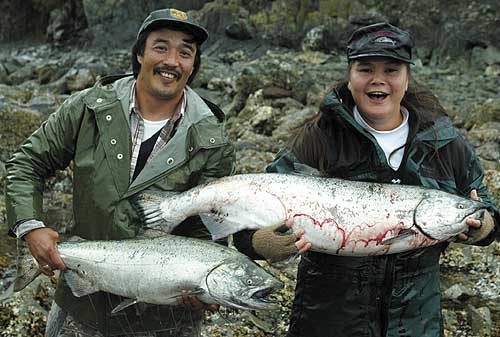All the countries around the Caspian Sea, with the exception of Iran, have announced a ban on sturgeon fishing, which is disappearing.

Here's another recommendation/wish: give up the luxury caviar that comes from sturgeon from the Caspian Sea. All the countries around the Caspian Sea, with the exception of Iran, have announced a ban on sturgeon fishing, which is disappearing. The fish that reaches sexual maturity at the age of 20 can live a hundred years... provided it is not fished. The female that carries eggs weighs about 200 kg, a third of this weight is the eggs/caviar, and their price to the consumer reaches thousands of dollars per kilo. Obviously, the temptation to fish for sturgeon is huge. Indeed, most sturgeon-derived caviar from the Caspian Sea comes through smuggling and illegal wild fishing. Therefore, our warm recommendation addressed to caviar lovers - choose salty sticks!
While the spirits are raging in the debate held around the request of several countries to resume whaling, while the hunt continues under the guise of "research", or simply ignoring agreements and treaties, it turns out that many of the fish species in the oceans need more protection. Global warming, water pollution, and above all excessive fishing, cause the depletion of fish in the oceans and seas (over-fishing). A warning along these lines comes from the United Nations Environment Program (UNEP) and the World Conservation Union (IUCN).
In the Ecosystems and Biodiversity in Deep Waters and High Seas report submitted by these two organizations, the countries are called to create marine reserves that will include coastal areas and deep ocean areas, outside of "sovereign waters", that will include the expanses of the oceans and protect an environment that is constantly being destroyed.
The fishermen who go fishing in deep water have no idea how this activity affects the global fish stock. Fishing with trawl nets causes environmental destruction that harms the reproduction of those species of fish that are caught, and in any case leads to a direct harm to the livelihood of the fishermen and a decrease in the amount of fish supplied to the world markets.
One of the reasons for the depletion of the fish is the fishing in "Sharka -" long-line fishing, a fishery that continues to exist even though it was declared illegal. It refers to fishing done with rods that stretch for tens of kilometers, and thousands of baits hang from them. With these rods, you can catch thousands of turtles and about 300.000 birds every year. In addition, fishing that is not sustainable, that is, does not take care of preserving young individuals so that they can be used as a reproductive nucleus for the next generation, caused a 90% decrease in fishing for large fish: tuna, swordfish and the like. Another factor is the 20.000 pieces of plastic that cover every square kilometer in the ocean!
According to the WWF organization, the tuna fishery in the Mediterranean Sea and the eastern Atlantic Ocean is facing collapse due to overfishing, mainly, despite international agreements, which were created to prevent the depletion or complete disappearance of certain fish populations, and which dictate the amount of fish allowed in each country's fishery. According to the organization, the reports regarding the quantities of fish arriving from different countries are false, and in fact, are 40% lower than the actual quantity. Traditional fishing for tuna (done by "traditional" fishermen) on the shores of the Mediterranean Sea and in the ocean, has been going on for hundreds of years, and in recent years an 80% decrease in the catch has been diagnosed (a decrease in the fishermen's livelihood)!
And in addition, it turns out that the pollution of the sea with "nutrients" (fertilizers of various kinds) causes the proliferation of jellyfish. The jellyfish feed on plankton and phytoplankton. These multiply because of the pollution, providing more food for more jellyfish at the same time as wild fishing reduces the population of species that feed on jellyfish, two opposing processes that upset the balance.
A study conducted on the coast of West Africa shows that overfishing, pollution and warming have led to a depletion of the fish population at the same time as a population "explosion" among jellyfish, to the point that the biomass (weight) of jellyfish is three times greater than that of fish.
These and other data led the authors to address the issue. In the report, the authors request the creation of marine reserves in large areas, i.e. outside "sovereign waters", which would be international reserves. More than 60% of the marine biological diversity is found outside the areas of "sovereign waters", therefore, also outside the framework that states can protect. Without proper protection, the damage to the marine environment will increase and its economic consequences (significant decrease in fish quantities) are already felt today.
